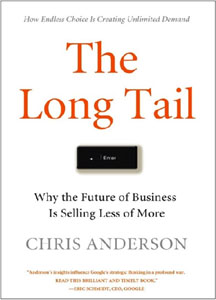|
|
Quinta-feira, 24/8/2006 Less of More Julio Daio Borges
"What happens when everything in the world becomes avaliable to everyone?" A primeira frase é minha. Está num texto de março, pouco lido e comentado... A segunda é do Chris Anderson. Porque meu exemplar chegou ontem; e porque é bom saber que estamos em sintonia afinal... Julio Daio Borges |
|
|


